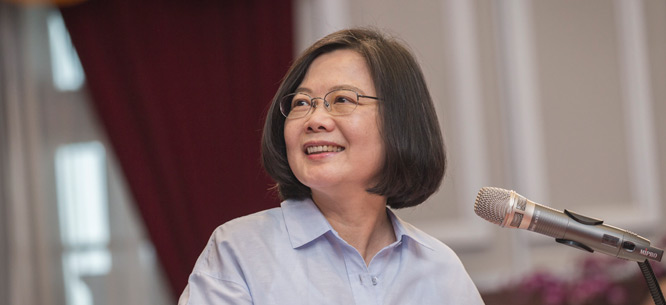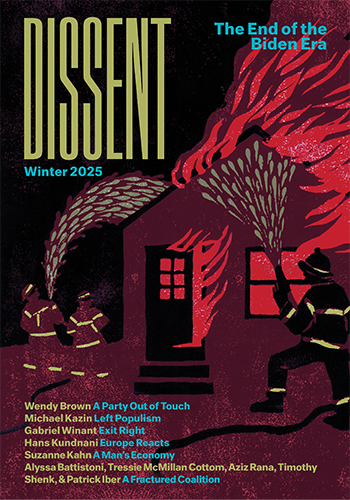The Island the Left Neglected
The Island the Left Neglected
If the American left is serious about opposing a reactionary foreign policy that preserves unequal power relations, it should speak up for Taiwan.

Imagine a small, peaceful, progressive island in Asia about the size of Maryland. Ruled until the Cold War’s very end by a military dictatorship, it is now a robust democracy, although it endures incessant hostility from its giant neighbor. Its people treasure their hard-fought equality, free press, and vibrant civil society.
Forty-three out of its 113 lawmakers are female, which, in proportion, is almost double that of the U.S. Congress. With a modern, efficient single-payer healthcare system like Canada’s, it provides comprehensive insurance coverage for every citizen at the cost of just around 6.2 percent of its GDP per year. A bill granting aboriginal languages official status was passed in May 2017 as part of a wider endeavor to uphold the rights of its indigenous communities after they received a formal government apology earlier for centuries of “pain and mistreatment.” The landmark decree by its highest court that same month is paving the way for it to become the continent’s first nation to legalize same-sex marriage. It is also striving to meet an ambitious goal to phase out nuclear power by 2025 and ensure that one-fifth of its total energy output is renewable.
Its sixty-two-year-old leader, Tsai Ing-wen, is a woman with no kinship or marriage ties to a political dynasty, unlike any of her Asian counterparts before her. A former professor of international law, she made her debut in public service in the 1990s as a trade negotiator, before working her own way up in the male-dominated world of politics, serving as a cabinet member, lawmaker, vice premier, Democratic Progressive Party (DPP) chairwoman, and now president. She swept to a landslide victory in January 2016 by gaining 56.1 percent of all ballots cast in a three-way race. Her pan-Green coalition—a broad alliance consisting of groups that favor a greater degree of democracy and self-determination—concurrently won a majority in the parliament, called the Legislative Yuan, for the very first time.
Of course, the country is real; it is Taiwan.
Many Americans may be unfamiliar with it, which is a consequence of its isolation on the global stage. It is barred from belonging to the UN and dozens of other intergovernmental organizations. As of this fall, only seventeen countries—down from twenty just months earlier—recognize it at all. None have diplomatic relations with Beijing.
Boasting the world’s largest standing army and an expansionist outlook, the People’s Republic of China deems Taiwan a “renegade province” that must be “reunified” in due course. And because the Chinese claim the island as part of their territory, they go out of their way to block its international participation. Essentially, they have made befriending Taiwan a zero-sum game for anyone who dares to do so, and the rules are simple: Engage with us and we will reward you; engage with them and we will punish you. It is fierce dollar diplomacy Beijing insists on waging, and Taipei can’t win.
Understandably, Taiwanese people, especially the progressive youth, have grown increasingly unenthusiastic about China. In a recent poll that asked whether unification is an option if China democratizes (itself a long shot), just 24 percent of respondents aged thirty-nine or below said yes, while 73 percent said no. Since 2009, according to another survey, a majority of the island’s population has consistently self-identified as Taiwanese—not as Chinese, nor as both—a sign that they have long assumed their de facto independence. As Xi Jinping continues to rule China with an iron fist and as Taiwan marches forward, the gap across the strait will only widen.
Just how dedicated the island’s new generation is to a homeland free of Chinese interference was on full display when the Sunflower Movement broke out in the spring of 2014, during which student activists stormed the Legislative Yuan chamber and would remain there for twenty-four days. Their demand? To withdraw the Cross-Strait Service Trade Agreement, which, initiated by then-President Ma Ying-jeou, would have pitted small Taiwanese businesses against state-owned Chinese enterprises. Half a million people took to the streets of Taipei in solidarity with the sit-in that drew inspiration from Occupy Wall Street. The DPP was likewise sympathetic. Together the united opposition prompted the deal’s indefinite postponement. Two years later, Tsai dropped all criminal charges against the protesters following her inauguration as Ma’s successor.
As a diverse, tolerant country with a leader who has shattered the ultimate glass ceiling for Asian women, there is every reason to expect that Taiwan’s most faithful allies in the U.S. are on the left. Except that is not the case at all: American progressives tend to view it as either a reactionary state or one of no importance.
On December 2, 2016, Donald Trump made history when he accepted President Tsai’s brief congratulations on his election victory over the phone. It was no more than a “courtesy call,” Mike Pence said. Several prominent Congressional Republicans, including House Speaker Paul Ryan and Senator Tom Cotton, thought it was a terrific idea. John Bolton, who would later become Trump’s national security advisor, electrified conservatives when he declared on Fox & Friends: “Nobody in Beijing gets to dictate who we talk to.”
But then came the partisan backlash. It just so perfectly fit the anti-Trump narrative: a buffoon elected president who was already, before taking office, eroding well-established “norms” because he was either too reckless or too ignorant. “That’s how wars start,” tweeted Senator Chris Murphy. Trump’s “flippant calls” were “threatening to create diplomatic crises,” Vanity Fair asserted in the same article that compared Tsai with other controversial world leaders with whom Trump had also spoken, like Rodrigo Duterte of the Philippines and Nursultan Nazarbayev of Kazakhstan, as if she, too, was a notorious human rights abuser. Ned Price, a spokesman for Barack Obama, rushed to reiterate the discriminatory “One China” policy—designed by Henry Kissinger in 1972—in the name of “peaceful and stable cross-Strait relations.”
Most U.S. front-page headlines described the conversation negatively, portraying it not as an opportunity to bolster the United States’ ties with Taiwan but as an unprovoked violation of Chinese sovereignty. The false perception of Tsai as a Trump sidekick intent on throwing East Asia into disarray was widespread. Trevor Noah, on his Daily Show, mocked her English accent and ridiculed her as an Uber driver “in the Camry” too insignificant for Trump. Even serious progressives concentrated just on the dangers of approaching Tsai, a supposed “blunder of potentially historic proportions,” as Vox put it, that only foreign-policy amateurs like Trump could make.
Absent from the mainstream media discourse were the views of ordinary Taiwanese, most of whom do not remotely share Trump’s politics but were delighted to learn of their country’s long overdue acceptance and validation on the international stage. One commentator called it “the happiest thing” for Taiwan since the Jimmy Carter years.
For Lin Fei-fan, a former Sunflower student leader, the put-downs of Taiwan and its leader were tremendously frustrating; how could the same Americans who would otherwise advocate the core values his country epitomized deride it this way? The “anxious reaction” was just an attempt “to score political points against Trump,” he and two fellow youth activists argued in the Washington Post. “We are puzzled why many commentators have treated Trump’s move as an ‘affront’ to authoritarian China rather than consider the possibility of normalizing relations with a democratic nation of 23 million people, many of whom share deep affinities with the United States,” they added. “Despite having the world’s 21st-largest GDP and a larger population than that of Australia, our flourishing multicultural society is internationally silenced and played as a pawn of superpower politics.”
If it sounds peculiar that supporting arguably the most progressive Asian country is an agenda so affiliated with American conservatism, it is because the left has yet to elude the shadows of the Cold War.
When China embraced communism in 1949, the defeated Kuomintang (KMT)—under the repressive rule of Generalissimo Chiang Kai-shek and, later, his son Chiang Ching-kuo—retreated to Taiwan. It was deeply suspicious of its domestic critics, like far-right regimes elsewhere, and it was always planning to fulfill its hopeless fantasy to finish the unfinished Chinese Civil War. Beijing, too, never ceased wanting to capture Taiwan. So, as late as the waning days of 1986, this was the scenario Washington faced: neither side could accept coexistence as they each claimed to be the sole, rightful owner of China and Taiwan combined. To keep gambling on Beijing—which first began with Richard Nixon’s famous visit in 1972 and formalized when Carter severed diplomatic ties in 1979 with Taipei—seemed sensible enough.
It was not at all imaginable that Taiwan would be the one to emerge as Asia’s beacon of freedom so soon while China would backslide.
But by 1989, the younger Chiang was dead, the island’s thirty-eight-year-old martial law was gone, and Lee Teng-hui, a one-of-a-kind transformative figure, was in firm control. The new leader swiftly did away with the ridiculous fangong dalu (“counterattack the mainland”) motto for good and decriminalized opposition parties, which facilitated the DPP’s first electoral gains. After the Tiananmen Massacre, on the other hand, George H. W. Bush made an early resolution against sanctioning the Chinese, which aggrandized the loose but growing group of pro-Taipei neocons that would come to be known as the Blue Team (in contrast to Red China). American ties with Beijing then increased dramatically under Bill Clinton, who was, at best, lukewarm about Taiwan.
Still, the island defied all odds and kept progressing. For eight months in the run-up to its first-ever direct presidential election in March 1996—a legacy of the 1990 Wild Lily Movement and the Lee administration’s subsequent reforms—the Chinese military conducted a series of aggravating missile tests aimed at painting Lee as a warmonger and intimidating the electorate into voting against him. It backfired. Two American warships arrived at the last minute to avert a probable escalation, and he handily won the race that transformed him from Taiwan’s last authoritarian leader to its first popularly elected one. Democratization was completed four years later, in 2000, when DPP presidential candidate Chen Shui-bian’s remarkable victory—thanks to a historic voter turnout rate of 82.7 percent—facilitated the KMT’s peaceful concession of power.
Simultaneously in Washington, the Blue Team became ever more influential with Congress, think tanks, and even the incoming president’s inner circle. But while George W. Bush and his neoconservative allies were keen to confront Beijing early in his first term, they soon found themselves needing crucial Chinese cooperation in North Korea and especially the Middle East after 9/11; this compelled Bush to speak out against Taiwanese independence in December 2003. The “One China” policy hence survived as a cornerstone of American foreign policy. Obama’s “pivot to Asia” did not alter that either, as he kept Taiwan out of the Trans-Pacific Partnership negotiations, although the free-trade pact was itself designed to counterbalance China’s regional clout.
Today in Trump’s America, the staunchest supporters of Taiwan have been the same band of Republican hawks, from heavyweights such as Bob Dole and the late John McCain to Senators Marco Rubio and Ted Cruz, who are descendants of the Blue Team. Because of this interconnection, the issue continues to be perceived as a right-wing cause with which progressives are reluctant to be associated. Yet the vicious cycle need not continue: Taiwan is now Green, not Blue.
In fact, most Taiwanese no longer regard Chiang Kai-shek as an honorable commander who lost the Civil War but as a ruthless tyrant who, for some three decades during the period known as White Terror, tortured, imprisoned, and murdered tens of thousands of dissidents. In February 2000, the city of Taoyuan completed construction of the Cihu Memorial Sculpture Park, where over 200 torn-down Chiang statues from across the country have since been collected and rebuilt, right next to the former KMT headman’s mausoleum. This was far from adequate, so the Legislative Yuan passed a sweeping transitional-justice bill last year requiring the removal of all remaining commemorative symbols of Chiang from schools, institutions, and public spaces.
The rejection of Chiang’s memory reflects an undeniable reality: the old assumption that both Taiwan and China long to unite as one nation-state but disagree on which regime has legitimacy is simply not accurate anymore. Beijing’s failure to uphold the promise of autonomy in Hong Kong and Macau only makes unification with Taiwan even more far-fetched. For Americans in this day and age to still defend Kissinger’s “One China” policy—a shameful, self-serving lie to please the Chinese—is to pretend otherwise; the passive strategy aims to do the bare minimum to maintain the status quo, a status quo that is inherently unjust.
It is high time for the political left to rethink Taiwan. Progressives’ silence—whether because they are oblivious to the island’s changing political landscape or disinclined to anger Beijing—does a grave disservice to the Taiwanese people who have come such a long way.
And they still have a long way to go.
Taiwan’s egalitarian democracy is fragile. Having moved away from the Chiang family’s extremism, the KMT remains one of the two major political parties, currently with thirty-five seats in the Legislative Yuan. Should the traditionalist pan-Blue coalition—which clings to the anachronistic conception of “Greater China” and runs on a platform of restoring the cross-strait consanguinity—return to power in the future, it could reverse much of the island’s recent progress. Its aging, shrinking, but energetic base of support also forms a powerful force resisting efforts to officially ditch Taiwan’s obsolete name: the Republic of China. Meanwhile, the forward-looking DPP has other internal obstacles to overcome. Taiwan’s wages are modest for a developed economy, for instance, and almost 90 percent of the population oppose abolishing the death penalty, which is common in Asia.
But where the island struggles most has always been on the world stage. When the SARS epidemic was killing hundreds of victims in neighboring Hong Kong and China back in 2003, Taiwanese epidemiologists had to combat the disease alone after the WHO denied them access to samples and information. Few things have changed over the years. The International Olympic Committee returned a verdict this May that forced Team Taiwan to keep playing under the awkward “Chinese Taipei” designation in the forthcoming Tokyo 2020 Games. Even with the deck stacked against it, however, Taiwan has not stopped fighting for respect and recognition.
The island merits them; it has never exploited its diplomatic alienation to act out. Rather, it has proven time and again to be a responsible, if minor, power. At a time when many Western countries are turning inward, Tsai has called immigrants “an infusion of new strength and a force for cultural diversity.” Her administration is also backing various nonprofit groups, in addition to spearheading its own initiatives, to offer refugees across the globe—in Iraq, Jordan, Thailand, Nauru, and Italy—Taiwanese economic and medical assistance.
Separately, Reporters Without Borders decided last year against opening a new Asian bureau in Hong Kong—which has lost its reputation as a bastion of free speech under heavy-handed Chinese jurisdiction—and picked Taipei instead. According to the organization’s 2018 World Press Freedom Index, Taiwan ranks the highest in Asia (and even higher than the U.S.), while China is placed, along with Syria and North Korea, in the bottom five globally.
If the American left is serious about opposing a reactionary foreign policy that preserves unequal power relations, it should speak up for Taiwan. Its enlightened views on gender, ethnicity, and class have translated into a social structure that’s reminiscent, in certain ways, of Northern Europe’s. Its capability and readiness to tackle the greatest challenges of our time, from terrorism to climate change, make it a well-deserved member of the international community. Its unlikely historical trajectory shows that bringing genuine progress to a part of the world where individual liberties are more often threatened than cherished is possible.
Jeffrey C. H. Ngo is an activist historian of and from Hong Kong. Currently pursuing his PhD in History at Georgetown University, he also serves as chief researcher for Demosisto, the Hong Kong-based youth political group that advocates self-determination. In 2017–18, he was a visiting scholar at the University of Toronto.




